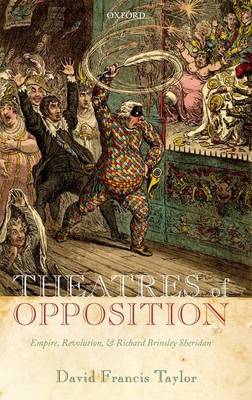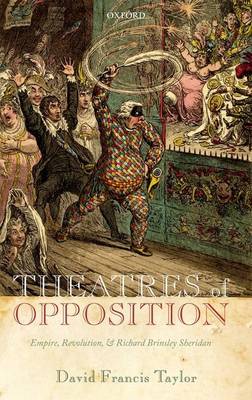
Vous voulez être sûr que vos cadeaux seront sous le sapin de Noël à temps? Nos magasins vous accueillent à bras ouverts. La plupart de nos magasins sont ouverts également les dimanches, vous pouvez vérifier les heures d'ouvertures sur notre site.
- Retrait gratuit dans votre magasin Club
- 7.000.000 titres dans notre catalogue
- Payer en toute sécurité
- Toujours un magasin près de chez vous
Vous voulez être sûr que vos cadeaux seront sous le sapin de Noël à temps? Nos magasins vous accueillent à bras ouverts. La plupart de nos magasins sont ouverts également les dimanches, vous pouvez vérifier les heures d'ouvertures sur notre site.
- Retrait gratuit dans votre magasin Club
- 7.000.0000 titres dans notre catalogue
- Payer en toute sécurité
- Toujours un magasin près de chez vous
Theatres of Opposition
Empire, Revolution, and Richard Brinsley Sheridan
David Francis Taylor
Livre relié | Anglais
175,95 €
+ 351 points
Description
Richard Brinsley Sheridan is best known as the author of two of the English stage's most popular comedies, The Rivals and The School for Scandal. In his own lifetime, however, Sheridan was as renowned a politician as he was a playwright, and during a parliamentary career that spanned thirty-two years - the large majority of which he spent in opposition - he was an advocate of reform, a supporter of the French Revolution and of Irish independence, and a fierce critic of the government's curtailment of civil liberties. Drawing upon a wide range of sources, from previously unpublished manuscript materials to political pamphlets and satirical cartoons, Theatres of Opposition rehabilitates this too often forgotten figure, and offers the first detailed examination of the complex simultaneity and interconnectedness of Sheridan's theatrical and political practices. Moreover, by tracing the artistic and professional trajectory of Sheridan as a playwright, radical parliamentarian,
celebrated orator, and playhouse manager, this book sheds important new light on the overlap between theatrical and political cultures in London during the last thirty years of the eighteenth century. Sheridan, Taylor contends, provides a prism through which we can revise our understanding of the ways in which the sites of power and performance habitually bled into one another at this time. Excavating a theatrical politics as precise as it is problematic, Theatres of Opposition speaks to a spectrum of interests, from theatre and political histories to the studies of oratory and visual culture.
celebrated orator, and playhouse manager, this book sheds important new light on the overlap between theatrical and political cultures in London during the last thirty years of the eighteenth century. Sheridan, Taylor contends, provides a prism through which we can revise our understanding of the ways in which the sites of power and performance habitually bled into one another at this time. Excavating a theatrical politics as precise as it is problematic, Theatres of Opposition speaks to a spectrum of interests, from theatre and political histories to the studies of oratory and visual culture.
Spécifications
Parties prenantes
- Auteur(s) :
- Editeur:
Contenu
- Nombre de pages :
- 296
- Langue:
- Anglais
Caractéristiques
- EAN:
- 9780199642847
- Date de parution :
- 07-04-12
- Format:
- Livre relié
- Format numérique:
- Ongenaaid / garenloos gebonden
- Dimensions :
- 216 mm x 140 mm
- Poids :
- 482 g







